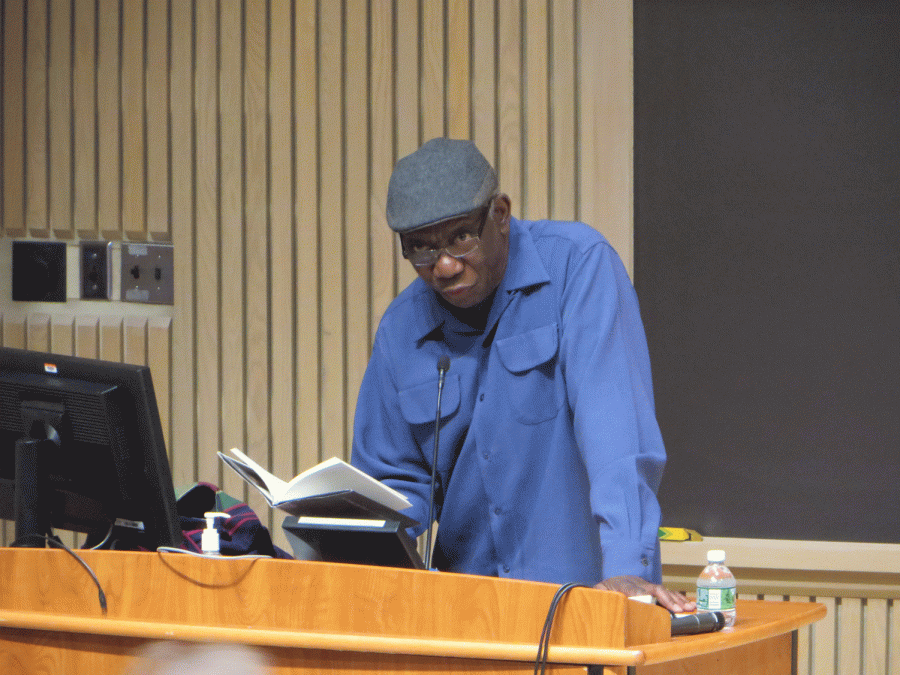Award Winning Poet Yusef Komunyakaa Broadens Student Perspective on Poetry
The multi-talented poet, opera writer and playwright shares his past work in a unique and effective way
Yusef Komunyakaa spoke at Colgate Friday, February 24, as part of the English Department Poetry Series. The poet, librettist (opera writer) and playwright shared a variety of his works with faculty, students and townspeople in Love Auditorium. Komunyakaa began writing poetry as a student at the University of Colorado, Colorado Springs where he earned his M.A. in Writing. He went on to earn an M.F.A. in Creative Writing from the University of California, Irvine and then began his career as an associate professor at Indiana University in Bloomington.
The American poet currently serves as State Poet of New York and teaches in the Graduate Creative Writing Program at New York University. His works have met tremendous success. He is a recipient of the 1994 Kingsley Tufts Poetry Award, the 1994 Pulitzer Prize for Poetry, the Ruth Lilly Poetry Prize and the 2007 Louisiana Writer Award. Many of his works including “Slipknot,” “Saturnalia,” “Gilgamesh: a Verse Play” and “Testimony” have all been
performed internationally.
Initially, no one could hear Komunyakka speaking. Everyone leaned forward, straining to hear him. He laid out several books on the podium and read from each one. Many attendees were familiar with Komunyakaa’s profound works. Junior Lauren Sanderson studied his poems in Professor Peter Balakian’s poetry workshop class.
“He plays with silence a lot more with his spoken. I loved watching him process where the pauses were. Because I guess, obviously, when I’m reading off the page. I guess where he’s [going to] pause, and what he’s thinking. But there’s a certain level of emotion that comes from where he chooses to pause, so that was really beautiful to hear, and just the actual tone of his voice is just gorgeous,”Sanderson said.
Other audience members who hadn’t been as extensively exposed to Komunyakaa’s works experienced a variety of his poems and their origins for the first time at the reading. Komunyakaa talked about how his decision to write about the time he served in Vietnam wasn’t planned, but that it just happened. He also explained how the lengths of his poems don’t necessarily correspond with their content.
“Some are short and cover both small and great things. Others go on for ages, a million thoughts caught in one sentence,” Komunyakaa said.
Komunyakaa made it clear that the most minute detail can be significant. He noted this after reading “Ode To The Maggot.” The maggot was a small thing that he witnessed as a child and
later revisited as an adult. His remarks upon his works before and after reading each piece added clarity and insight to listeners and gave them a further appreciation for poetry.
“I’ve never really been much of a poetry reader, but I thought it would be interesting to connect to poetry on a different level by hearing it spoken aloud. I think that really came out today as the author’s voice really melded with the words, and it felt like at times the voice became the poetry. That was very different for me, and I enjoyed it,” sophomore Erin Hoffman said.
There’s no doubt that Komunyakaa’s printed word is impactful, but hearing him speak truly added another dimension to his works. This lecture was a chance for students who were already familiar with his work to hear it live from the poet himself, and for students who were unfamiliar to gain a new perspective and appreciation for poetry as a whole.







